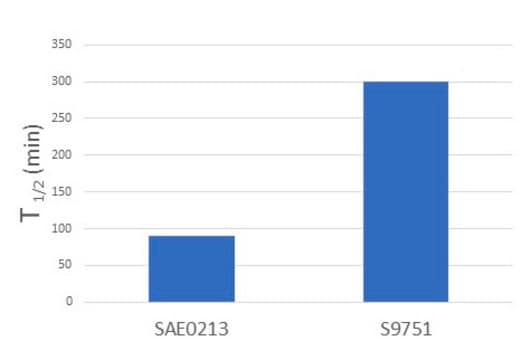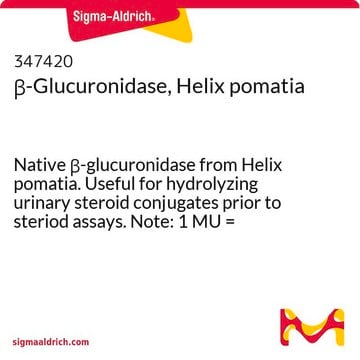1.04114
ß-Glucuronidase/aryl sulfatase
(from Helix pomatia) stabilized aqueous solution for biochemistry EC 3.2.1.31 + EC 3.1.6.1
Synonym(s):
Aryl sulfatase
Sign Into View Organizational & Contract Pricing
All Photos(1)
About This Item
UNSPSC Code:
12352204
NACRES:
NA.21
Recommended Products
Application
β-Glucuronidase/arylsulfatase has been used:
- to study the existence of gluco- or sulphoconjugated analytes in pig plasma samples
- to hydrolyze corticosteroid conjugates
- as a component of the sodium-acetate buffer for hydrolysis of Parus major fecal extracts
Biochem/physiol Actions
β-Glucuronidase is involved in the physiological activity and toxicity of several xenobiotics and drugs. It catalyzes the elimination of glucuronic acid from β-D-glucuronides.
Analysis Note
β-Glucuronidase (4-Nitrophenyl-β-D-glucuronide; pH 3.8; 38.0 °C): about 30 U/ml
Arylsulfatase (4-Nitrophenylsulfate potassiumsalt; pH 6.2; 38.0 °C): about 60 U/ml
Arylsulfatase (4-Nitrophenylsulfate potassiumsalt; pH 6.2; 38.0 °C): about 60 U/ml
Signal Word
Danger
Hazard Statements
Precautionary Statements
Hazard Classifications
Resp. Sens. 1 - Skin Sens. 1
Storage Class Code
12 - Non Combustible Liquids
WGK
WGK 3
Flash Point(F)
Not applicable
Flash Point(C)
Not applicable
Certificates of Analysis (COA)
Search for Certificates of Analysis (COA) by entering the products Lot/Batch Number. Lot and Batch Numbers can be found on a product’s label following the words ‘Lot’ or ‘Batch’.
Already Own This Product?
Find documentation for the products that you have recently purchased in the Document Library.
Customers Also Viewed
Determination of androstenone levels in porcine plasma by LC-MS/MS
Chen G, et al.
Food Chemistry, 122(4), 1278-1282 (2010)
Jens Hinge Andersen et al.
Analytica chimica acta, 617(1-2), 216-224 (2008-05-20)
A solid phase extraction (SPE) method for extraction and clean up of 9 synthetic corticosteroids was optimized for quantification by reversed-phase high-performance liquid chromatography/negative electrospray ionisation mass spectrometry. Clean up was accomplished using a mixed mode polymeric strong anion exchange
Punsaldulam Dashnyam et al.
Scientific reports, 8(1), 16372-16372 (2018-11-08)
Gut bacterial β-D-glucuronidases (GUSs) catalyze the removal of glucuronic acid from liver-produced β-D-glucuronides. These reactions can have deleterious consequences when they reverse xenobiotic metabolism. The human gut contains hundreds of GUSs of variable sequences and structures. To understand how any
Tapio Eeva et al.
Ecotoxicology (London, England), 23(5), 914-928 (2014-04-05)
We manipulated dietary lead (Pb) levels of nestlings in wild populations of the great tit (Parus major L) to find out if environmentally relevant Pb levels would affect some physiological biomarkers (haematocrit [HT], fecal corticosterone metabolites [CORT], heat shock proteins
Our team of scientists has experience in all areas of research including Life Science, Material Science, Chemical Synthesis, Chromatography, Analytical and many others.
Contact Technical Service










